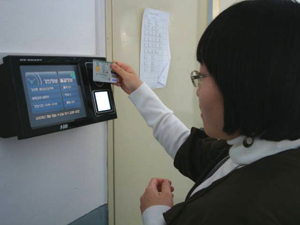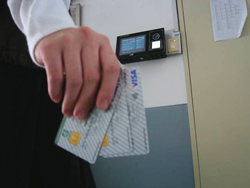Electronic Attendance System,
What is Wrong?
By Kim Ji-eun, Student Editor
Chonnam National University (CNU) has introduced a digital and multifunctional system, called the ‘Smart Card System,’ which started this semester to act as a master-key around campus. With a Smart Card, whose main function is to serve as identification, students can pay for goods and services, use public transportation and loan books from the CNU library. As one of the functions, the Electronic Attendance System (EAS) has been initiated beginning this semester and is substituted for oral roll call. This system allows students to check into class by putting the card up to an EAS machine. In this issue, Chonnam Tribune inquires into the advantages of the EAS as well as the problems that may result from this new system.
Electronic Attendance System

If you attended a class with more than fifty students, you would have experienced that the professor spends about ten or fifteen minutes just for calling the roll. The authorities of CNU took a measure to prevent this situation for a more effective education. The answer was the EAS, the machines which are installed in liberal arts classrooms that have the capacity of up to 80 students. You can find them next to classrooms doors. At present, there are thirty-nine altogether, thirty-three found in Gwangju and the rest on Yeosu campus.
The way to attend a class with the EAS is very simple. When you come to your classroom, bring your Smart Card and put the card to the EAS machine. Then, the machine recognizes your attendance. That is all. The newly introduced EAS has many advantages. First, professors are able to take attendance quicker by just having students lay their cards on the screen. Secondly, by using the EAS, professors can check the exact condition of student attendance and distinguish precisely among attendants, latecomers and absentees because it shows whether one student puts the card on the screen at the scheduled time. For its accuracy, most students try to come in advance before a class starts. Then, students are able to calm themselves and prepare for a lesson in the break time. Moreover, as professors do not have to take attendance, they can use the whole class time more efficiently than before.
What is the Problem?
Although the EAS has many good points, many students and professors do not think it is an effective attendance system. Some professors still check the exact condition of student attendance by making a roll call instead of the EAS. It is said that students feel somewhat troubled due to the system. Why does this situation happen? Let’s examine the reasons.
If students forget to flash their Smart Cards or to bring the card, they are recognized as an absentee, even though they are actually attending the class. In this case, students should go and see professors and explain their situation. “It is too much trouble for students,” Park Yu-jin (Sophomore, Dept. of Early Childhood Education) said, “because students should additionally tell a professor about their circumstances, it is possible to suffer if the professor is busy or late for the class.” In addition, students have to take attendance during the break time. So, we often see a curious sight that many students stand in line in front of electronic machines in order to take attendance during the break. It is a nuisance, too.

In the case of professors, before installing this system, they should have called students’ names one by one and looked at their faces and checked an attendance book even though there are many students in the class. This kind of attendance check may provide professors with the opportunity to interact with their students one by one. However, the EAS makes professors lose the chance to do this with students in a huge class. Joo Seong-rae (Lecturer, Dept. of Clothing and Textiles) said, “If students take attendance by using the card in my class, I will never call my students’ names until the semester ends. If so, I miss the chance to communicate with each student and feel that I would become estranged from my students.”
From the topics that have been mentioned above, the authorities should have considered various aspects that the new system could induce prior to establishing it. However, the biggest problem of the EAS is substitute attendance. In fact, if a student brings another student’s Smart Card, it is possible to falsely attend. Han Se-young (Freshman, Dept. of Business and Administration) said, “It became easier to do substitute attendance than before the EAS installation. I saw more people substitute for other students abusing the weak points of the system more so than last semester. Besides, some students just leave the class after checking their card on the screen of the electronic machine.”
Let the Incident Become a Lesson
On CNU campus, there are lots of problems due to lack of conscienceness. Burglaries and theft are frequent in the White Library and our campus grounds are messy because CNU students are careless about where they place trash and smokers drop cigarette butts. Above all things, students’ substitute attendance is a typical example of the lack of morality at CNU. As you see above, the EAS is introduced for a good purpose but students and professors complain about its inconvenience, contrary to the expectations. CNU should make this mistake be a lesson and remember that serious consideration in various ways is needed before introducing a new system in order to prevent such a mishap again. Although CNU had better take measures and retool the system in order to improve a weak point firstly, it is a point of students’ conscienceness. The recovery of public morality is also needed so that this system achieves its original purpose as much as possible. We should act according to our conscienceness.
The officer in charge of the EAS said, “No matter how advanced a system we install, there will be abuses and it will become trashed if students misuse it.” We should have the collective conscienceness as intellectuals while at CNU. Let us hold firm to our conscience in order to make a healthy and reliable university culture. Every student is under an obligation to make a mature university culture by having a good conscience.

